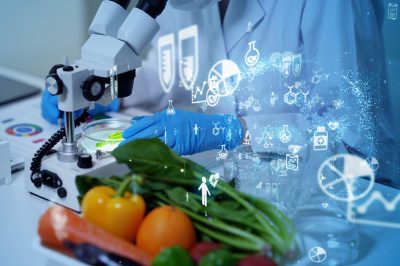The safety, healthiness, and nutritional content of the food we eat depend, to a large extent, on the advancements in food technology. It has made considerable strides, changing outdated practices into contemporary ones that increase shelf life, retain nutrients, and solve environmental and health issues.
Food science and Technology Advancements
Blockchain has transformed transparency and traceability in the food supply chain. For instance, Walmart used blockchain technology to trace the movement of mangoes, enabling them to locate the origin of a contaminated batch in a matter of seconds and avert possible health risks.
Customized food labeling using 3D printing is a fantastic advancement. Italian food firm Barilla introduced 3D-printed pasta designs to meet each individual’s dietary choices and nutrient requirements.
AI has made it possible to create novel textures and flavors. For instance, a food technology startup called NotCo uses AI algorithms to develop plant-based substitutes for everyday items made from animal products, such as milk and mayonnaise.
The rising desire for tailored food products reflects consumers’ expanding nutrition awareness. In addition to dietary limitations, organizations like Habit provide tailored nutrition advice based on a person’s DNA, maximizing health outcomes.
Alternative protein sources, such as lab-grown meals and plant-based meats, address challenges of sustainability and resource scarcity. Companies like Beyond Meat and Impossible Foods are paving the way for plant-based meat replacements that taste and feel similar to their traditional animal counterparts.
Also Read: Sony Xperia 1V Unrivaled Innovation
Food science and Economy
The food science and technology sector has a substantial economic impact by producing jobs and stimulating growth. For instance, the development of the plant-based meat sector has brought about the construction of new manufacturing facilities and increased job opportunities.
Food waste has decreased as a result of innovations in food processing. A plant-based covering created by Apeel Sciences increases fruits’ and vegetables’ shelf lives, preventing food waste and promoting a more sustainable food system.
A nation’s ability to export food can be increased by incorporating creative products with distinctive flavors and textures. The global adoption and success of Japan’s ramen and sushi cultures demonstrate the financial benefits of food technology.
Food science and technology have unquestionably altered how we produce, eat, and think about food. These developments have enhanced nutrition and food safety, stimulated economic growth, decreased waste, and offered long-term answers to pressing problems. As technology advances, the future of food science promises even more innovative and significant innovations that will alter how we nourish ourselves and support our world.








